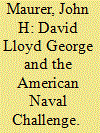| Srl | Item |
| 1 |
ID:
178364


|
|
|
|
|
| Summary/Abstract |
The First World War spurred the United States to acquire – in the words of Woodrow Wilson – ‘incomparably the greatest navy in the world’, and amongst the many problems confronting Britain after 1919 was how to avoid an Anglo-American naval arms race. David Lloyd George was determined not to sleepwalk into another struggle for naval mastery. He rejected the expert opinion of his top naval advisers that building capital ships would enhance Britain’s security. Instead, he showed restraint in responding to the American naval build-up, while doggedly pursuing arms control talks with Washington. He thus prevented an escalation of the naval arms competition that emerged after the war, and so created the favourable conditions for a negotiated settlement of the naval rivalry with the United States and provided for Britain’s security at sea.
|
|
|
|
|
|
|
|
|
|
|
|
|
|
|
|
| 2 |
ID:
170289


|
|
|
|
|
| Summary/Abstract |
British war aims concerning Germany developed haphazardly during the Great War of 1914–1918. The vicissitudes of unexpectedly conducting total war–one lasting more than four years–periodically deflected their consideration. Inter-Allied diplomacy and pressures from non-governmental lobbyists from Central–Eastern Europe seeking independent states to succeed the Habsburg, Romanov, and Wilhelmine empires forced reconsideration at crucial moments, for instance, after the advent of the nascent Bolshevik regime in Russia in late 1917 to early 1918. So, too, did British public opinion. Nonetheless, the British government had a clear general strategy: return stability on the European continent. In this context, the prime minister after December 1916, David Lloyd George, became central. Beyond the general aim, however, he wanted to avoid firm commitments over a range of issues touching Germany to give him flexibility in negotiating with the other Allied leaders at the eventual Peace Conference. Thus, less concerned with the minutiae of transforming war aims involving German territorial losses, disarmament, and paying for the war, he looked to make deals that might lack strategic purpose.
|
|
|
|
|
|
|
|
|
|
|
|
|
|
|
|